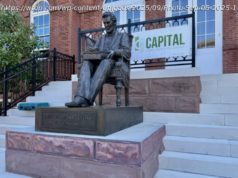A new book examines literary, cultural and historical factors that led to lasting impressions of the Midwest as «flyover country.».
The name of President Donald Trump appears only once in professor Jon Lauck’s new book about perceptions of the Midwest as «flyover country, » and then only in a footnote involving polling in Missouri.
Yet the book’s exploration of decades-old historical trends helps explain the attraction Trump held in the election for people who felt alienated by the political and cultural mainstream.
«When the twentieth century dawned, the American Midwest stood tall as the republic’s ascendant and triumphant region_economically prosperous, politically formidable, culturally proud, and consciously regional, » Lauck writes in «From Warm Center to Ragged Edge: the Erosion of Midwestern Literary and Historical Regionalism, 1920-1965.»
Yet just a few decades later, in an era of growing globalism, «vocal intellectuals recast the Midwest as a repressive and sterile backwater filled with small-town snoops, redneck farmers, and zealous theocrats, » wrote Lauck, a history and political science professor at the University of South Dakota.
The book takes its title from an observation by Nick Carraway in F. Scott Fitzgerald’s «Great Gatsby»: «Instead of being the warm center of the world, the Middle West now seemed like the ragged edge of the universe — so I decided to go East and learn the bond business.»
The region’s isolationist tendencies after World War II were out of sync with the rest of the U. S., Lauck said, and these tendencies clashed with the country’s growing cosmopolitanism and desire to be part of the larger world.
Intellectuals’ increasing hostility toward the Midwest also discouraged some writers from telling the region’s stories, including accounts of everyday life in the Midwest, Lauck wrote. Others who tried were pushed aside, such as Ohio’s own Louis Bromfield, a Pulitzer Prize-winning novelist who is now little known outside the state.
«It is a major cultural problem in this nation, the extent to which the coasts kind of dominate the culture — Manhattan and Hollywood in particular, » Lauck said in an interview.
History professor Nicole Etcheson dates coastal disdain for the Midwest farther back into the 19th century, when the area was still considered the «West, » a region inhabited by uneducated people including an ungainly looking fellow named Abraham Lincoln whose accent and demeanor took the country some getting used to.
«Flyover country has deep historical roots in old regional prejudices and attitudes of the East toward the uncivilized frontier, » said Etcheson, who teaches at Ball State University.
Among some additional observations in Lauck’s book, published last month by University of Iowa Press.
— «Geography and history and place and regional attachments still matter in the world. Fargo is not San Diego. The revolts of the Quebecois and Catalonian secession and Grexits and Brexits continue to lead the news and Scottish rebels still fight the 1707 Act of Union.»
— «Victorian ideals were especially strong in the rural areas and small towns of the Midwest, leaving the region vulnerable to the criticisms of the literary modernists.»
— «The early Midwest was the place that the first genuinely American tradition of democracy took root, after all, and where the democratic tradition expanded to include more of the republic’s citizens and a functional ethnic pluralism took root.»
Sign up today for a 30 day free trial of unlimited digital access.






